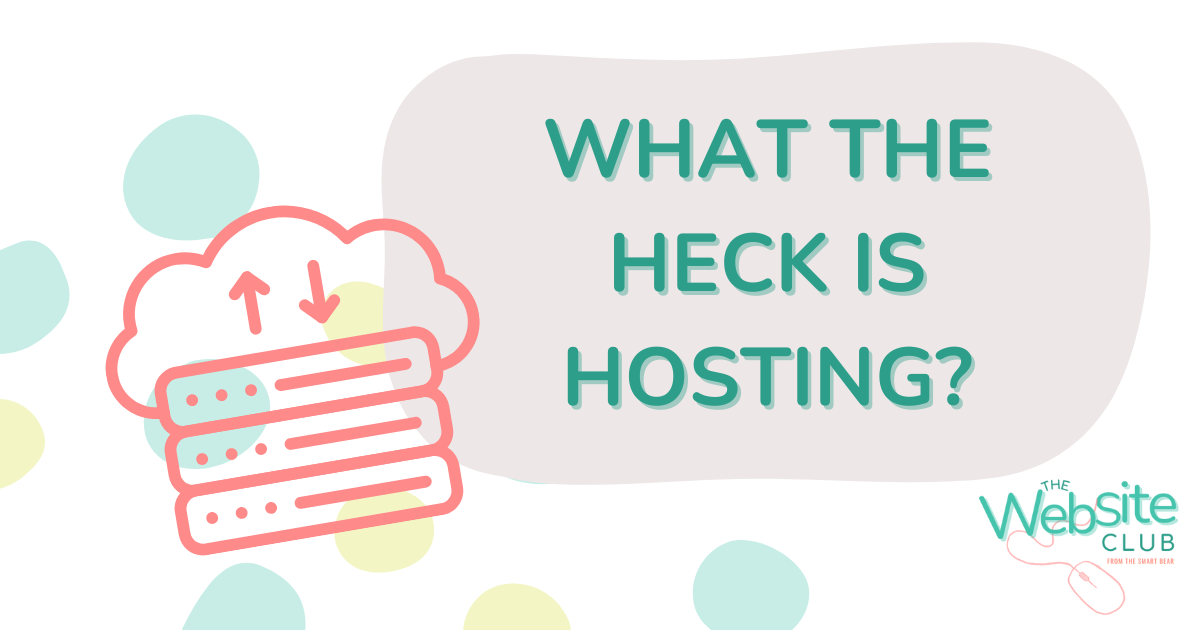For website newbies, the subject of hosting can be quite confusing - what the heck is it?!
Every website needs to be stored somewhere. You may choose to rent space from a platform builder like Wix, Squarespace, GoDaddy, or Wordpress.com which is usually a set cost per month (payable monthly or yearly) depending on which package you want.
Or you may decide that you want to have more control and buy server space from a hosting provider like GoDaddy, Heart Internet, Siteground, 123Reg, or Ionos.
Essentially it’s just a big computer (or a section of a computer) known as a server that stores all the files and databases for your website which can be connected to the world wide web by using special addresses known as DNS (Domain Name System Internet protocol suite).
Either way, you’ll need to do some research to see which is the best option for you. Look at things like do they offer support, how much storage or bandwidth do you get, do you get any additional features etc. All this may influence your decision. You may also want to check their reviews on something like Trustpilot, and their ethics and values may also be important to you.
And before you make that choice, you may want to decide on the platform you’re going to build on first - WordPress, Squarespace, Wix, Shopify and other builders are all options but you need to decide what’s right for you and your business. More on this later.
When do you need hosting?
You will need hosting if you're not 'renting' a space on website builder software. But the good news is, it’s can be a lot less than ‘renting’ a website on a subscription model. I’ll cover these types of platforms later on.
The other benefit of hosting is that the files and database can be moved around to get a better deal, or more resources - you own the content, it’s yours. Whereas with a ‘rented’ space, you can’t move the files around or get a better deal. You’re tied to using their software and they have the option to increase their pricing, or change their product, at any time. They may also limit what you can do with their software.
However, the benefit of using ‘rented’ spaces is that you don’t have to look after any software yourself, updates will likely be included, and there is help on hand, should you need it.
That’s not to say hosting providers don’t offer support - they do, but it’s limited support and they may not be able to help you with specific website issues (although it’s worth asking!).
How much is hosting?
Prices start around £2 per month for 'shared hosting’ (sharing resources) - which is fine for a small site. E-commerce websites might need a slightly bigger package around £8-10 per month.
However, as your business - and website - grows, you might need something with more resources. There’s the option to have ‘virtual private servers’ (VPS) which is where you have all the resources to yourself but not the whole server - it just acts like you have the whole server. Or you could hire a whole private servers where nothing is shared. Bigger businesses usually prefer these as it’s more secure and reliable but they come at a price. The prices do vary but for a VPS you’re looking at anything from £40 per month upwards and a lot more for private servers. Of course, big companies like Facebook have data-centers full of their own servers.
For newer websites it’s unlikely you’d need anything more than shared hosting for a while.
Email Servers
It looks more professional to have your email connected with your domain name than one through hotmail, outlook or gmail (known as disposable emails which are often used by spammers) so instead of yourbusiness@gmail.com it’s something like email@yourbusiness.com
The good news is most hosting providers let you have at least one of these domain emails with their package, included with the cost or at a small additional fee.
Or you may choose to have your email held in a different place and this gives you more flexibility when moving the website at a later date. Stand-alone providers of email include places like Microsoft Office 365, Google Workspace (used to be called GSuite), Zoho Mail or Rackspace.
Rented platforms do not normally come with email but do have some partnerships with places like Google Workspace.
When researching look at things like how much storage can you get, how much is it for additional email addresses or forwarders, can it be accessed from anywhere (called webmail), does it come with spam protection etc. These factors may influence your decision and think long term - you may only want one email address now but you may want 10 next year, for example.




